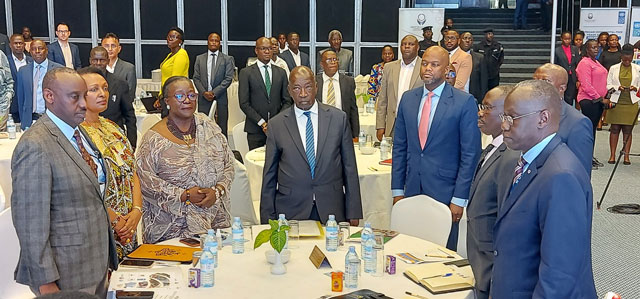
Kampala, Uganda | THE INDEPENDENT | Uganda might not get maximum benefit from the African Continental Free Trade Area (AfCFTA) unless the cost of doing business in the county and East Africa is worked on, according to the private Sector.
The costs cited include in areas of access to finance, quality of infrastructure, and standardisation.
n a statement presented to the AfCFTA, the business community says most of the business operators in the country are small and medium enterprises which are in need of cheap long-term finance, yet Afrexim conditions do not cater for that business segment.
In 2022, the AfCFTA secretariat and the African Export-Import Bank (Afreximbank), signed an agreement for the Bank to manage Base Fund of the AfCFTA Adjustment Fund, a fund aimed at supporting African countries and the private sector to effectively participate in the new trading environment established under the AfCFTA.
However, presenting their statement in Kampala, Richard Mubiru, a board member at Uganda Manufacturers Association said the Afreximbank currently is not designed to serve SMEs.
Stressing the need for financing, Mubiru said most of the country’s trading partners in the region are facing political instability and insecurity, meaning that to trade comfortably, the exporters need export guarantee products which are currently scarce.
Unfortunately for them, some of the biggest trading partners, also are facing a scarcity of foreign exchange, said Mubiru, without mentioning the countries.
Several African countries, including Kenya, Egypt, Zimbabwe, Nigeria, Ghana and Zambia, have been experiencing dollar shortages for the last two years.
Reports show that Kenya, Uganda’s major export destination, has suffered the scarcity since the outbreak of coronavirus, after the country almost depleted her forex reserves to prop up the sharply depreciating currency.
Emeka Ozombo, Senior Advisor on Finance and Banking at Afreximbank dismissed the claims by the private sector, saying that maybe the problem is with Uganda. He explained that in many countries, SMEs have benefited from Afreximbank’s products.
He however, said that if the bank went out to lend using the models of commercial banks, it would be disastrous to the banks.
Export guarantee, Ozombo said they have even guaranteed exports to South Sudan, adding that Ugandans need information on the availability of the financing activities under AfCFTA.
The AfCFTA Secretary General Wamklele Mene noted that the private sector in Uganda and other countries on the continent lack a lot of information on opportunities available under the AfCFTA. He promised to bring all financing partners of the project into Uganda to discuss the shortcomings of the AfCTA and where Uganda feels left behind.
The dialogue was organised by the Uganda National Chamber of Commerce and Industry (UNCCI), together with the UNDP, the Ministry of Trade, Industry and Cooperatives as well as the AfCFTA secretariat.
UNCCI urged the governments in the EAC to fast the abolition of non-tariff barriers to improve trade with other countries.
Chamber president, Olive Kigongo, unless the EAC removed these barriers, it would be even harder to do business with the rest of the continent under the AfCFTA.
She however noted that in the region, Uganda had done commendably though more needs to be done.
Kigongo also urged Ugandans to improve the quality of their products if they were to compete with other countries, and the governments in the region to hasten the removal of all non-tariff barriers.
Despite the treaty that provides for the removal of border trade and travel restriction, some countries in the region are, for example, yet to drop the passport for the national identity card for cross border travel.
Only Uganda, Kenya and Rwanda have fulfilled this, while for an East African citizen traveling to Tanzania, Burundi, South Sudan or Democratic Republic of Congo need a passport.
Stephen Asiimwe, the Chief Executive Officer, Private Sector Foundation Uganda, says the failure to implement this is a mindset issue which must change. He also called for more focus on the infrastructure in Uganda and the region generally and called for stronger regional initiatives on infrastructure.
The United Nations Development Program Resident Representative, Elsie Attafuah expressed her marvel at Uganda’s beauty and enormous natural resources but wondered why they have not been adequately utilised for development.
She also noted as positive that Ugandans are adopting online tourism operations, which is becoming the new world normal.
However, the country must prove on the infrastructure and remove NTBs if it is to fit into the evolving global trade, according to Attafuah.
Wamkele Mene, the Secretary General, AfCFTA noted the need for more sensitisation of the private sector.
According to him, the opportunities that are presented by AfCFTA are currently seen as challenges and limitations.
He gave an example of Lesotho which imports copper wire from Ukraine to make car seats for export, yet the copper is mined from neighbouring Zambia and DR Congo who export it raw to Ukraine.
Minister for Trade, Industry and Cooperatives pledged to continue improving the environment for trade to thrive under the AfCFTA because, according to him, “it is a vehicle for unlocking the potential of intra-African trade and achieving the Africa we want.”
*****
URN
 The Independent Uganda: You get the Truth we Pay the Price
The Independent Uganda: You get the Truth we Pay the Price


